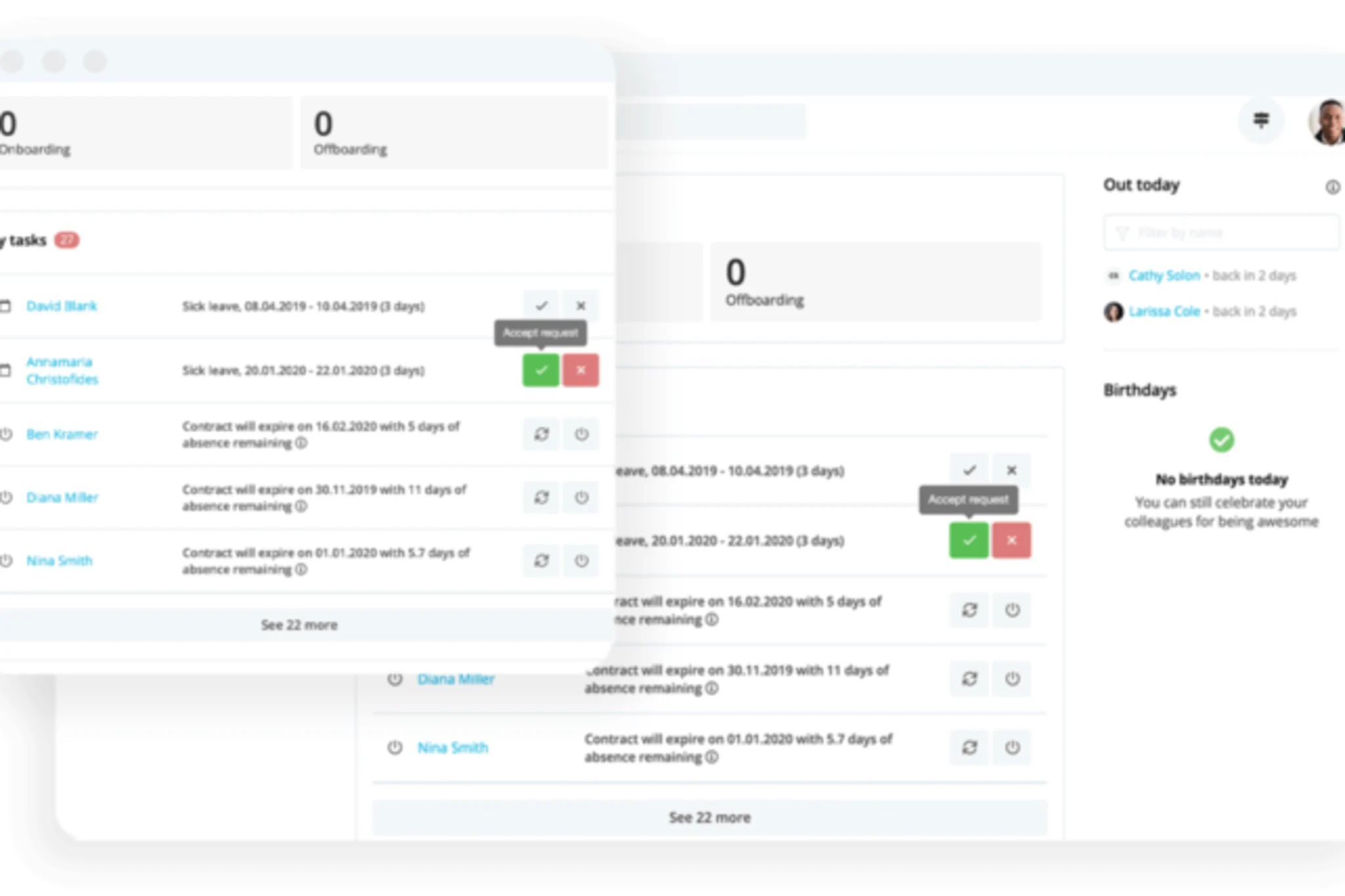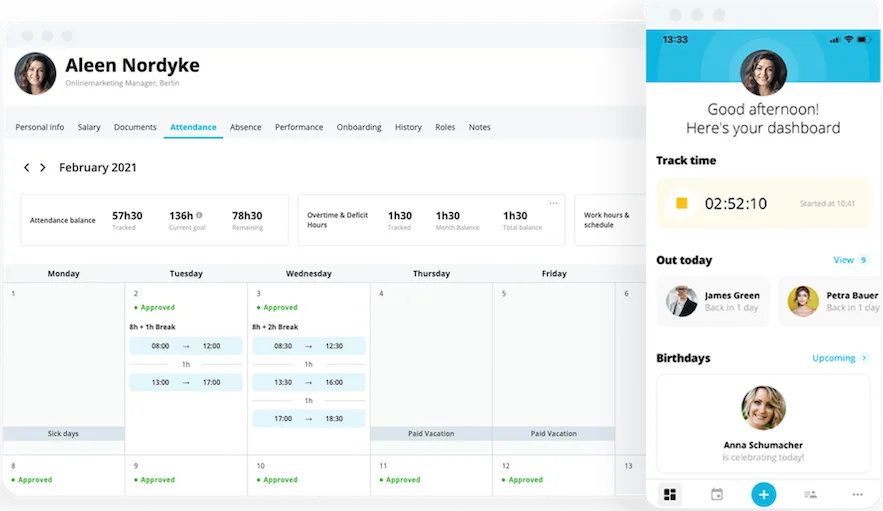The 10 UK HRM Policies Your Organisation Might Be Missing
HRM policies and procedures exist to give guidance and instruction to leaders, line managers and employees on how an organisation is designed to run. But, where do you start? In this post, we are detailing the 10 essential HR policies UK businesses need to have today.
Visible, manageable, scalable: employee documents and information with Personio.Contents
- 1What are HR Policies?
- 2What are HR Procedures?
- 3What Purpose Do HRM Policies Serve?
- 4Who Typically Develops HRM Policies?
- 5Writing an HRM Policy in 6 Steps
- 6Which HRM Policies Should Every Organisation Have?
- 7The 10 HR Policies Your Organisation Should Implement Today
- 8How Often Should You Review HRM Policies?
- 9Where Should HR Policies and Procedures Be Stored?
What are HR Policies?
HR policies are written guidelines for organisations on a host of topics. This would include a description of how things operate and what is expected of managers and employees. Policies can range from high-level guidance to day-to-day working responsibilities.
What are HR Procedures?
In contrast to HR policies, which are written guidelines, HR procedures are step-by-step instructions on how to execute a policy. An example might be how an HR department is expected to carry out a grievance procedure outlined by an overarching policy.
What Purpose Do HRM Policies Serve?
HR policies and procedures provide a necessary and transparent framework for what is expected of each and every employee. Additionally, they also help fortify and legitimate your team’s HR strategy – giving action to ideas and backing up philosophy with processes.
Policies and procedures also help boost your corporate culture. They can create an understanding and a strong sense of trust and fairness (when they are developed correctly).
Additionally, HR policies in the UK can help with:
Keeping up with the latest changes in UK law and legislation
Supporting overall business strategy (ideally through HR strategy)
Helping inform current and future HR processes and how they work best
To respond to the latest developments in the world of work
Ensuring your business can prepare adequately for times of crisis
To keep up with competitors and even boost your employer brand
Even when a policy is not legally required, having a policy in place can map out guidance and instruction for employees. This kind of clarity and consistency is important, as it gives a ‘single source of truth’ for every employee to understand and follow.
Who Typically Develops HRM Policies?
HR policies and procedures are an initiative taken up by HR teams. While this may depend on the size of your organisation, it helps to entrust policy work with a professional who has a high-level overview of an organisation or is able to manage multiple stakeholders.
For a small organisation, this may rely on a consultant or a part-time HR person (or a professional who has a passion for people management). In mid-sized organisations, this will typically be handled by a proper HR professional (or a small team).
As an organisation grows in size and onboards more and more employees, it becomes increasingly important for an HR team to apply particular focus on policy ideation and procedure execution. The idea is to create policies that grow with your people.
A larger organisation may even have multiple functions, like reward, talent acquisition, diversity, which all handle and make their own policies. In this case, it becomes even more important that you have an easy way to centralise all these policies in one place.
Writing an HRM Policy in 6 Steps
For an HR or people professional just starting out, how do you build the bones of your next great HRM policy? Let’s consider the following guidelines…
Give your policy a name (‘Reward Policy’ for instance)
Set a date for this policy to come into effect
Set out a general purpose for this policy (what you are trying to accomplish)
State the terms of the policy (including defining any terms or acronyms)
Clearly define who the policy applies to (full-time or part-time employees, for instance)
Specify a contact person (ideally the person creating it)
These are the bones that should form the structure of any great HR policy. That said, depending on what you are covering, you may also wish to retain legal counsel to ensure that your policy is within the scope of what is legal in the UK.
Which HRM Policies Should Every Organisation Have?
Let’s talk about some of the most essential HR policies for UK companies. If you are just building out a policy library, or revisiting what you have, here is where you should turn your attention first.
An easy way to start engaging with your policies is to consider the employee life cycle. This means you should first focus on policies that conform to each of the following stages:
Attraction
Recruitment
Onboarding
Retention
Development
Separation
The 10 HR Policies Your Organisation Should Implement Today
1. Attraction HR Policies
Referral Policy
Popular HR policies during the attraction phase typically revolve around having a clear referral policy. If you have a referral program and policy in place, you can make it much easier and incentivise current employees to recommend other smart professionals in their network.
Leave Policies
How you structure your leave can be a key differentiator when it comes to competing for the best talent. Any candidate will be interested in how much PTO they will be afforded, so it is crucial to have this policy set in stone from the very beginning.
Learn about all of the possible types of leave from work in our handy guide.
2. Recruitment HR Policies
Recruitment and Selection Policy
Your team is best served to outline your hiring practices, your diversity, equality and inclusion efforts, as well as how you go about handling promotions and transfers between departments. Keeping everything transparent can also bolster your candidate experience.
3. Onboarding HR Policies
Employee Relations Policy
We consider this a policy that falls within the ‘onboarding’ stage as it should be made clear to employees from day one. There should be a clear policy that outlines the terms of engagement when employees have issues with one another or need to loop in HR teams.
Employment Classification Policy
What kind of employees do you have under your employ? Full-time, part-time, contract? How many hours do they work? When do you expect work to get done? All of these things need to be set out so employees know what is expected of them the moment they start working for you.
4. Retention HR Policies
Reward Policy
Your organisation should have a clear reward policy when it comes to rewarding every employee at your company. Who is eligible for a raise? Which benefits are available to everyone? What about top performers? This is what you need.
Health & Safety
It is a legal requirement to pay respect to health and safety at work. This policy is essential, not only because it helps maintain the safety of all of your employees, but because it is legally mandated under UK law.
5. Development HR Policies
Learning & Development Policy
By crafting a proper learning and development policy, you can help open up opportunities for employees to get better at what they do. This could outline the use of budgets for development work, or courses employees can take to improve their work.
Performance Policy
How do performance reviews work? Who is up for a promotion and when? You need a performance policy to accurately communicate to your entire organisation how development looks and what it means to move up in your organisation.
6. Separation HR Policies
Grievances & Dismissal
Your HR team absolutely needs to have an employee grievance and dismissal policy and procedure. In it, you need to clearly outline grounds for dismissal, how employees can launch or appeal grievances and the steps HR needs to take in every case.
How Often Should You Review HRM Policies?
There are three key triggers that should signal a review of your HR policies:
Time - It is wise to revisit your policies on an annual or semi-annual basis to ensure that they are still in line with legal requirements or changing times.
Growth - If your company is growing, you may need to revisit some of your old policies and question whether they are fit for purpose. Or, create new policies entirely.
DeparturesorAdditions - If you have a new executive join or an old executive leave, you may want to rethink your policy decisions of the past and if they square with current company leadership and culture.
In any event, it is a helpful exercise to revisit your policies. It’s not only a good idea when it comes to compliance, but ensuring that you have policies which match the needs of your leaders and your workforce.
Where Should HR Policies and Procedures Be Stored?
The most difficult aspect of HRM policies is determining whether to keep them. As an example, Personio offers a Digital Employee File where all crucial employee documents and information are stored and circulated. They can also be signed electronically, too, for pertinent policies.
The fact is that all of your policies should be stored in a clear place. Employees should know where to find them, where to read them and where to sign them. Without that centralised location, many of your HR processes will suffer overall.
Meet The People Operating System
WATCH: Get to know Personio in three minutes

We need your consent to load this service!
This content is not permitted to load due to trackers that are not disclosed to the visitor.
Personio is an all-in-one HR software designed for every stage of the employee life cycle.
Using Personio, you can manage all your most important HR processes from one place. Recruit, manage, develop and pay your employees from one centralised HRIS.
For HR professionals, you can unlock new levels of productivity and influence. Become the HR business partner that your business needs, by getting back time for what matters: your people.
For line managers, Personio seamlessly builds automated performance cycles, tracks vacation days and keeps employee information up-to-date (and in a compliant fashion).
For employees, no more fussing with cumbersome tools and processes. Employees can request days off, change their information and keep track of goals and more. All from one place.
Speak with an expert today about your HR needs and how Personio can meet them. Or, give Personio a spin for yourself by starting your very own free trial right now. It’s all yours for 14 days.


